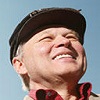1.1: Introduction
- Page ID
- 25415
Winston Churchill pointed out that “All the great things are simple, and many can be expressed in a single word— freedom, justice, honor, duty, mercy, hope.” Should we try to define these? Can we define them?
We should at least try to define our subject, ecology; many textbooks start with definitions. But first, for background, consider how we might define life. Marvin Minsky was an artificial intelligence researcher and computer scientist who thought about definitions. When is an object alive? Think about viruses, genes, self-reproducing machines—no one has really been able to give a good definition of “living” that satisfies in general. Some things are clearly living—mice—and some clearly are not—rocks. Lists of what makes something living used to appear in textbooks:
- Self-reproducing
- Responds to stimuli
- Metabolizes
- Made of protoplasm—protein, carbohydrates, DNA.
But (1) puts out the mule, (2) and (3) put out the spore, while if those conditions are dropped, (4) will admit the frankfurter. One can go on to extend the list with more careful qualifications, but questions remain until the list grows to include special mention of everything we can think of.


